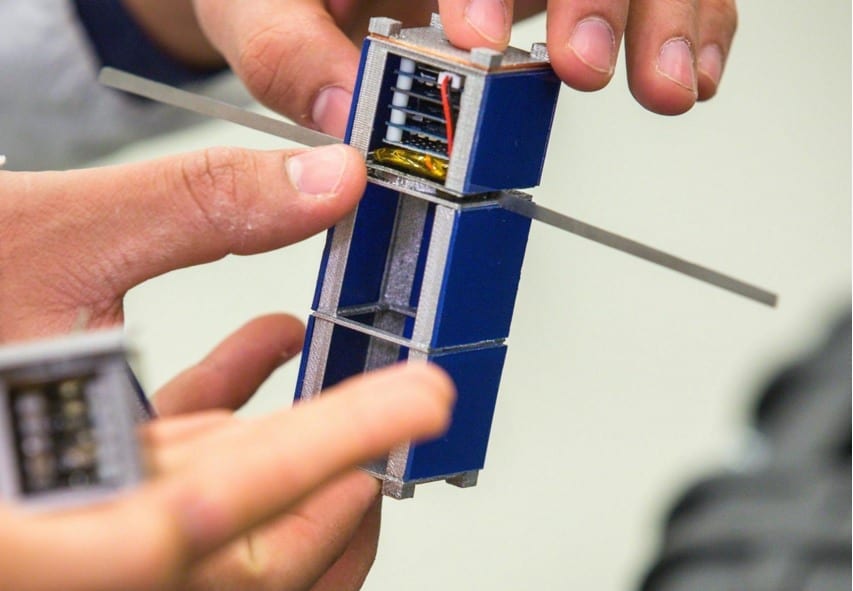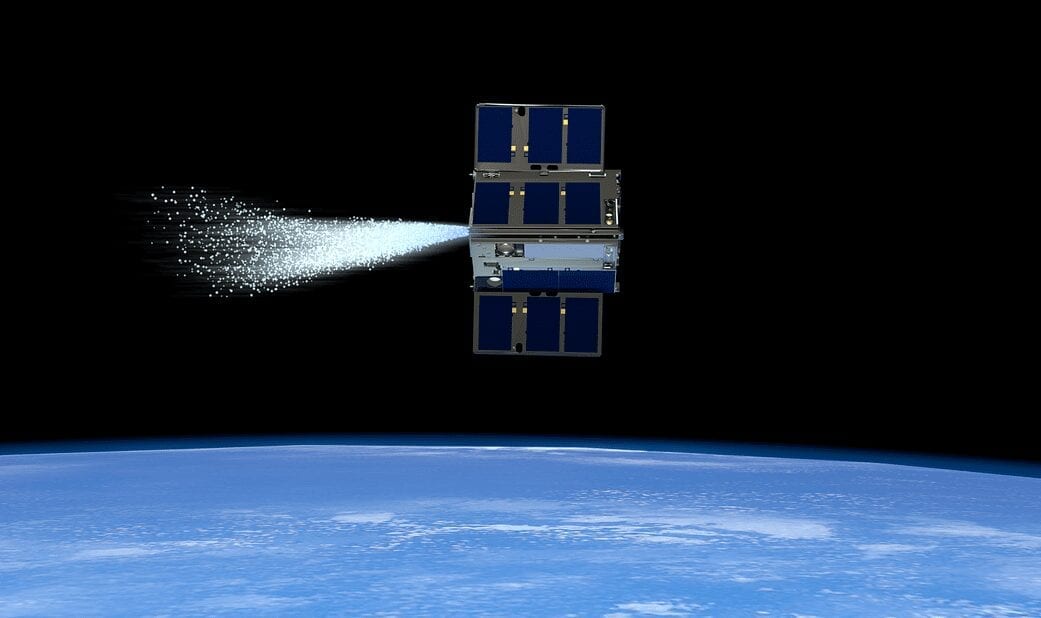
The next big thing in space is really, really small
Going into space is now within your grasp.
A tiny spacecraft being developed at Arizona State University is breaking the barrier of launch cost, making the price of conducting a space mission radically cheaper.
“With a spacecraft this size, any university can do it, any lab can do it, any hobbyist can do it,” said Jekan Thanga, assistant professor in the School of Earth and Space Exploration and head of the Space and Terrestrial Robotic Exploration (SpaceTREx) Laboratory.
Thanga and a team of graduate and undergraduate students — including Mercedes Herreras-Martinez, Andrew Warren and Aman Chandra — have spent the past two years developing the SunCube FemtoSat. It’s tiny — 3 cm by 3 cm by 3 cm. Thanga envisions a “constellation of spacecraft” — many eyes in many places. A swarm of them could inspect damaged spacecraft from many angles, for example.
Thanga and the School of Earth and Space Exploration will host a free kickoff event Thursday night introducing the SunCube, followed by a panel discussion with scientists and space-industry professionals on the logistics, opportunities and implications of this breakthrough technology. (Find event details here.)
Launch and launch-integration costs currently run into $60,000-$70,000 per kilo. The Russians, the Chinese and the Indians all charge about the same amount, too. That can get pretty pricey for a full-size satellite.
“These high costs put out of reach most educational institutions and individuals from the ability to build and launch their own spacecraft,” ASU’s team wrote in a paper detailing the new model.
Launch expenses for the SunCube FemtoSat will cost about $1,000 to go to the International Space Station or $3,000 for flight into low-Earth orbit. (Earth escape will cost about $27,000.)
“That was a critical price point we wanted to hit,” Thanga said. When SpaceX’s Falcon Heavy rocket lifts off later this year, Thanga expects costs to drop by as much as half.
Parts cost for a SunCube FemtoSat should run in the hundreds of dollars. A garage hobbyist could literally fly his or her own mission. One example is the solar panels. They aren’t available off the shelf in this size, so students cut them from scraps sold at a huge discount by manufacturers.
“That’s part of our major goal — space for everybody,” Thanga said. “That’s how you invigorate a field. … Getting more people into the technology, getting their hands on it.”
SpaceTREx is a systems lab, so the team members were less interested in creating a tiny spacecraft than they were solving a problem: Can lots of little spacecraft do the job of a single large spacecraft?
Over the two years they’ve worked on the spacecraft, Thanga and his grad students have stayed focused on miniaturization with a vision toward creating disposable spacecraft for exploration.
“There’s a whole community out there interested in this idea of low-cost, swarms of disposable spacecraft,” Thanga said.
And they’re getting smaller and smaller, thanks to smartphone tech, which has miniaturized everything.
“We’re piggybacking on the wave of miniaturization,” Thanga said. “We’re interested in tackling the space access problem. What if we can have students send experiments into space? With something as small as this, you can make mistakes and send again.”
Learn more: The next big thing in space is really, really small
The Latest on: Cube sats
[google_news title=”” keyword=”cube sats” num_posts=”10″ blurb_length=”0″ show_thumb=”left”]
via Google News
The Latest on: Cube sats
- Aiming for Apophison May 9, 2024 at 7:29 am
Attendees at an ESA conference said asteroids as large as Apophis rarely fly this close to the Earth, making it an unmissable opportunity.
- Pakistan's first lunar mission, iCube Qamar, deployed in orbiton May 8, 2024 at 3:41 am
Cube Qamar, Pakistan's first-ever lunar mission, has been successfully deployed in orbit, Geo.tv reported on Wednesday, citing Dr Khurram Khurshid.Dr Khurshid, who is a member of the ...
- Knowing what time it is on the Moon isn't as easy as it may seemon May 8, 2024 at 1:09 am
Meanwhile, numerous uncrewed missions will also be in place, with each Artemis mission releasing numerous lunar CubeSats. ESA will also be deploying its Argonaut European Large Logistics Lander. These ...
- Rocket Lab pushes back Neutron debut to 2025on May 7, 2024 at 9:20 am
As Rocket Lab prepares to begin tests of the first Archimedes engine, it says that Neutron won’t be ready for its first flight before the middle of 2025.
- NASA’s mini nuclear power generators step closer to realityon May 6, 2024 at 7:53 am
NASA approved a project led by the Rochester Institute of Technology aimed at creating a nuclear power source significantly smaller than those currently used in planeta ...
- Pakistan Lunar Mission: What are CubeSats? How big are they? Internet reactions and moreon May 4, 2024 at 11:33 pm
Pakistan's debut lunar satellite mission was launched Friday on board China's first lunar probe mission to collect samples from the far side of the Moon. The 53-day-long Chang'e-6 mission will collect ...
- Ariane 6 launches: Exolaunch's EXOpod Novaon May 3, 2024 at 9:48 am
Europe's newest rocket soon launches, taking with it many space missions each with a unique objective, destination and team at home, cheering them on. Whether launching new satellites to look back and ...
- Launch date set for NASA's PREFIRE mission to study polar energy losson April 30, 2024 at 11:55 am
NASA and Rocket Lab are targeting no earlier than Wednesday, May 22, 2024, for the first of two launches of the agency's PREFIRE (Polar Radiant Energy in the Far-InfraRed Experiment) mission to study ...
- A new era: Ariane 6 maiden launch campaign...on April 27, 2024 at 12:03 pm
On July 5, 2023, the Ariane 5 launch vehicle took flight for the last time, thus ending a storied 27-year career for what was Europe’s first heavy-lift rocket. Nearly ten months later, Arianespace is ...
- U of A set to launch student-led satellite missionon April 27, 2024 at 10:00 am
A University of Arizona student-led and built satellite will be launched into space. If the inflatable antenna works correctly, other missions will use it.
via Bing News










